
Are is a monotypic moth genus in the subfamily Arctiinae erected by Francis Walker in 1855. The type species is Are druryi, which is found on Jamaica. This species was described by Dru Drury in 1773 under the name Phalaena marginata, but this name is preoccupied by Phalaena marginataLinnaeus, 1758 and a new specific epithet, honouring Drury, was assigned in 1986.

Dactyloceras lucina is a species of very large moth of the family Brahmaeidae. It is found in central and west Africa, where it has been recorded from Equatorial Guinea, Ghana, Ivory Coast, Kenya, Sierra Leone, Uganda and Zambia. The species was first described by Dru Drury in 1782.

Ceretes thais is a moth in the Castniidae family. It is found in Brazil. Superficially it looks very like a butterfly, and was originally placed by Dru Drury in the "Papilio " group which mostly corresponds with modern Nymphalidae.

Antanartia delius, the forest admiral or orange admiral, is a butterfly in the family Nymphalidae. It is found in Senegal, Sierra Leone, Liberia, Ivory Coast, Ghana, Nigeria, Cameroon, Equatorial Guinea, the Republic of the Congo, Angola, the Democratic Republic of the Congo, Uganda, Kenya, and Tanzania. The habitat consists of lowland forests.
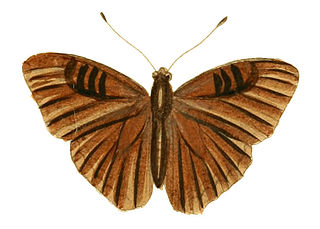
Euriphene doriclea, the Doriclea nymph, is a butterfly in the family Nymphalidae. It is found in Sierra Leone, Liberia, Ivory Coast, Ghana, Nigeria, Cameroon, Gabon, the Central African Republic, the Democratic Republic of the Congo and Uganda. The habitat consists of forests.

Euphaedra eleus, the Eleus orange forester, is a butterfly in the family Nymphalidae. It is found in Guinea, Sierra Leone, Liberia, Ivory Coast, Ghana, Nigeria, Cameroon, Gabon, the Republic of the Congo, Angola, the Democratic Republic of the Congo and Uganda. The habitat consists of primary forests and secondary forests with a closed canopy.

Euphaedra eupalus, the western blue-banded forester, is a butterfly in the family Nymphalidae. It is found in Guinea, Sierra Leone, Liberia, Ivory Coast, Ghana and Togo.
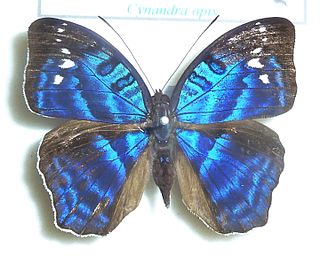
Cynandra opis, the brilliant nymph, is a butterfly in the family Nymphalidae. It is the only species in the monotypic genus Cynandra. It is found in Guinea, Sierra Leone, Liberia, Ivory Coast, Ghana, Togo, Nigeria, Cameroon, Gabon, the Republic of the Congo, the Central African Republic, Angola, the Democratic Republic of the Congo, Uganda and Tanzania. The habitat consists of dense forests.

Pseudacraea hostilia, the western incipient false acraea, is a butterfly in the family Nymphalidae. It is found in Sierra Leone, Liberia, Ivory Coast and western and central Ghana. The habitat consists of wetter forests.

Greta diaphanus, the Antillean clearwing, is a species of clearwing (ithomiine) butterflies, named by Dru Drury in 1773.

Crameria is a monotypic moth genus in the family Noctuidae erected by Jacob Hübner in 1819. Its only species, Crameria amabilis, was first described by Dru Drury in 1773.

Lucinia cadma is a species of brush-footed butterfly. It was first described by Dru Drury in 1773 from Jamaica. Distinct subspecies are found on other Caribbean islands.
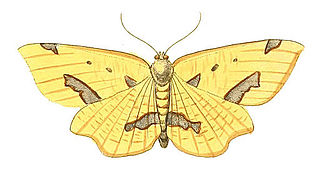
Xanthotype sospeta, the crocus geometer, is a species of moth in the family Geometridae. It was first described by Dru Drury in 1773 from Jamaica. It is also found in North America, where it has been recorded from Nova Scotia to southern British Columbia, south to Colorado and Georgia. The habitat consists of deciduous and mixedwood forests.

Letis hercyna is a species of moth in the family Erebidae. It was first described by Dru Drury in 1773 from Jamaica.

Otroeda cafra is a species of moth in the tussock-moth subfamily Lymantriinae. It was first described by Dru Drury in 1782 from Sierra Leone, and is also found in Cameroon, DR Congo, Malawi, and Nigeria.

Otroeda nerina is a species of moth in the tussock-moth subfamily Lymantriinae. It was first described by Dru Drury in 1782 from Sierra Leone, and is also found in Cameroon, DR Congo, Gabon, Ghana and Nigeria.

Panara jarbas is a species in the butterfly family Riodinidae found in Brazil. It was first described by Dru Drury in 1782.
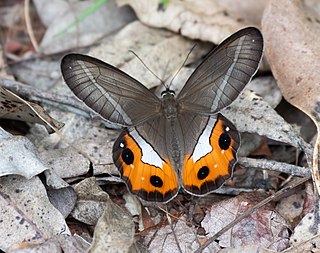
Pierella nereis is a butterfly species from the subfamily Satyrinae in the family Nymphalidae. It was first described by Dru Drury in 1782 from Brazil.
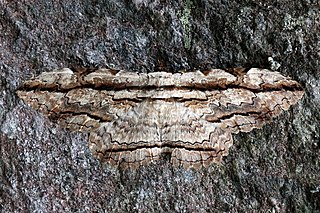
Thysania zenobia, the owl moth, is a species of moth in the family Erebidae. The species was first described by Pieter Cramer in 1776, and is native to North and South America and the Caribbean.

Lyssa patroclus is a species of moth in the family Uraniidae. The species was described by Carl Linnaeus in his 1758 10th edition of Systema Naturae from the Moluccas.



















